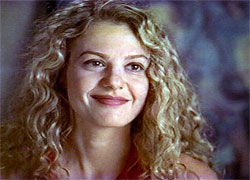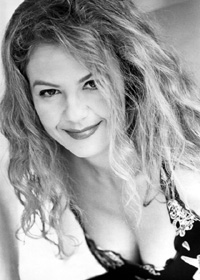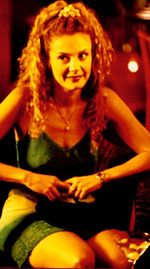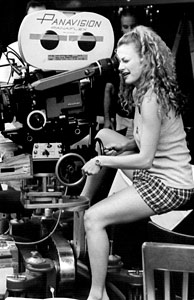
What’s in a name? For former-Miami resident Julie Davis, the word is “orgasm.” Although her latest film, titled Amy’s Orgasm, may sound like a fugitive from the skin-flick genre, beneath the “O” word is an unlikely love story between a feminist, self-help author and a radio shock-jock.

Davis, who is the film’s writer, director and star, was recently awarded the Breakthrough Artist Award at Miami’s first Sunlight Awards Gala for her work on the film. The achievement recognized her as “an artist reaching great heights.”
While the 34-year-old moviemaker’s ascension up Hollywood’s ladder appears to be a successful one, it has nonetheless been an arduous climb.
After graduating from Dartmouth, a starry-eyed Davis packed her bags and headed west to shake up Hollywood with her poignant ideas. But what she found when she arrived was cynicism and a bounty of hardships.
Today, with two films under her belt and a third in the works, Davis is setting herself apart from L.A.’s numerous wannabe moviemakers and proving herself to those who doubted her artistic ways in the beginning. The multitalented Davis takes some time to talk with us about how the business has treated her, who she’d love to work with and what she’d do if she ran Hollywood.
You moved to Hollywood right after college—was it difficult for someone of your age to be taken seriously?
Absolutely. I was 21 and no one takes you seriously when you’re that young. It was hard, but it’s all part of the experience. It’s a difficult business to break into, so it’s important to be tested at the very beginning to see if this is what you really want to do with your life. There are so many obstacles you have to go through and it really tests your commitment to making movies.
Tell me about your hardships trying to get your films out there.
Raising money is hard. I try to raise money independently so I can keep my vision in tact, and so I don’t have to answer to a committee of people. But the problem is, if you don’t have enough money, you can’t attract stars. It becomes harder to get the movie in the theater if you don’t have a star. For me, it’s been a lot of grassroots marketing, film festivals and word of mouth to get my movies out there.

in Amy’s Orgasm
Are you hoping to work with the big studios?
At this point in my career, I would like to work with a studio. I’d like to work with the bigger names to have that kind of support, but I still want to have my autonomy. It’s a hard mix, but I’m definitely ready to move up to the studio level and work with stars.
What do you consider your greatest success thus far?
I still see my first movie, I Love You, Don’t Touch Me, as the pinnacle for me. That was the one that got the most visibility, because it was at the Sundance Film Festival. I also think it was one of the best films, but they have all been exciting. Acting in Amy’s Orgasm was thrilling.
You’ve been a writer, director, producer and actor—which role is most fulfilling for you?
I think they’re all fulfilling except for producing. It’s the one thing I don’t like. It’s the business-side of making a movie. It’s where you have to fight all the battles.
You won the Breakthrough Artists Award at the Sunlight Awards Gala in May. Tell me how that felt.
It was great to be recognized in my hometown. It was exciting…
How did South Florida play a role in your film career?
It’s my hometown. Where you grow up is the place where your dreams start to come together. It’s where you become who you are. It’s really exciting to come home with a movie. I always fight to get my movies to open in Miami. With my first movie, I really put up a fight with the studio, MGM, to open in Miami. It happened at CocoWalk.
How do you feel the film industry is changing in South Florida?
It feels like it’s getting bigger. The locations are amazing, but it’s hard to compete with Los Angeles. L.A.’s history will always make it the center for movies. It would be nice to live in a city where movies are just one part of it and not the whole city. Where here [in L.A.], that’s what everyone does. And it starts to get claustrophobic.

Of all the films out there, which one inspired you to go into this career?
All the films of Woody Allen. He inspired me to write and direct.
Which film do you feel is the most overrated?
The Matrix. I don’t understand why more people flock to special effects movies than movies with emotional story content.
Is it hard being a woman in an industry dominated by men?
It is hard being a woman in this business. And so much of it is business, which requires you to be a real fighter. You have to be able to separate your emotional side from your business head. It’s difficult to put up a fight, then switch that off and go into the creative mode.
“I Love You, Don’t Touch Me” took you to Sundance in 1997. Tell me how that experience changed your career.
Sundance started my career. It gave me visibility. Everybody in the business saw the movie, and then they knew who I was. The critics responded well and that helped. It put me in the industry. I went from a wannabe to someone people took seriously.
How did your latest film, “Amy’s Orgasm,” get its name?
Amy’s Orgasm wasn’t the original title. Originally, it was “Why Love Doesn’t Work,” but Samuel Goldwyn [Goldwyn Films, Inc.], who bought I Love You, Don’t Touch Me, told me I needed to change the title. He said it was forgettable, and I should pick a title everyone would notice. He suggested I put the word ?orgasm? in it. I thought he was kidding, but I tried it. When the movie premiered at the Santa Barbara Film Festival, it sold out every night. I knew it was because of the title. When you don’t have a star, you have to do something to get people’s attention. When we sold the video to Blockbuster, they said we had to change the name. They wouldn’t carry it with the word ?orgasm? on the box, so it’s out on video as Amy’s O. But when you see it on TV ? it’s playing on Showtime right now ? it’s called Amy’s Orgasm.
Tell me about making the movie.
From the time I wrote it until the time it came out in the theaters was about four years. The budget was only $500,000, which was a lot more than my first one, but it’s still not a lot of money. When the movie was finished, there were a lot of things that didn’t work. I wanted to re-shoot, so I had to raise more money. That put the movie on hold for about a year. It took another two years to sell it. It was tough, but there was a happy ending. I raised money from businessmen in Miami…the husband of an old friend of mine… was in the audience of the South Beach Film Festival when I Love You, Don’t Touch Me showed. After the movie he said, ?I loved your movie, I’d love to finance the next one with a bunch of business partners.? Holy shit. I couldn’t believe it. They put up the money, so it really is a Miami production.
You wrote, directed and starred in Amy’s Orgasm. Wasn’t that sort of overwhelming?
It was hard to act in it, because it took away from my director’s eye. I was in front of the camera, instead of behind it. I couldn’t see what everyone was doing, including myself. It was like jumping out of a plane without a parachute and hoping you land OK. It was risky.
After this experience, will you ever act in one of your own films again?
I will never do a role this big. I was in every scene. I think it compromised my director’s head. I would love to act for someone else, but I don’t think I want to act in my next movie.
How much of you was in the character?
Basically, when I wrote it, I was in a new relationship, so it was like self-therapy. A lot of the character is me, which is why I did it. In a way, that’s offering the most authenticity to the part, but that also made it hard. It’s like being naked. But it was a lot of fun. Acting has always been my dream. I’m glad I did it.
Lets say you have a movie with a budget that allows you to work with whomever you want, who would you choose?
Meryl Streep is my favorite actress in the world. I think working with her would be like dying and going to heaven. I also like Cathy Bates. I love Lauren Ambrose from Six Feet Under. I want her to do my next film.
What are you working on right now?
I’m writing a script, another original screenplay. It was originally a TV series for Showtime. They decided not to do it as a series, so I’m doing it as a movie.
Over the past year, which movie had a role you would have loved to play?
I would’ve loved to play Nicolas Cage’s role in Adaptation, but as a woman. I also loved Julianne Moore’s role in Far From Heaven, although I would never play a role like that.
Why not?
(laughing)… I’m just not good enough.
What would you change about Hollywood?
I don’t even know where to start. It’s such a business and I wish it wasn’t. I wish there were more independent companies, true independent companies that weren’t owned by conglomerates. It takes away from the originality of what is created. But it’s a necessary evil. Ideally, I’d have my own production company, an endless source of funding, the ability to hire people I think are smart and then I’d just make a lot of movies.
In a perfect world, right?
In a perfect world, without having to answer to people who lack taste or have a different agenda. (laughing)… and if anyone who reads this wants to finance my next movie, they can e-mail me.
What advice do you have for aspiring writers, producers, directors and actors?
Don’t give up. Make as many short films as you can. Get a video camera, make a short movie and practice whatever it is what you want to do, so when you get the chance, you’ll be ready.
